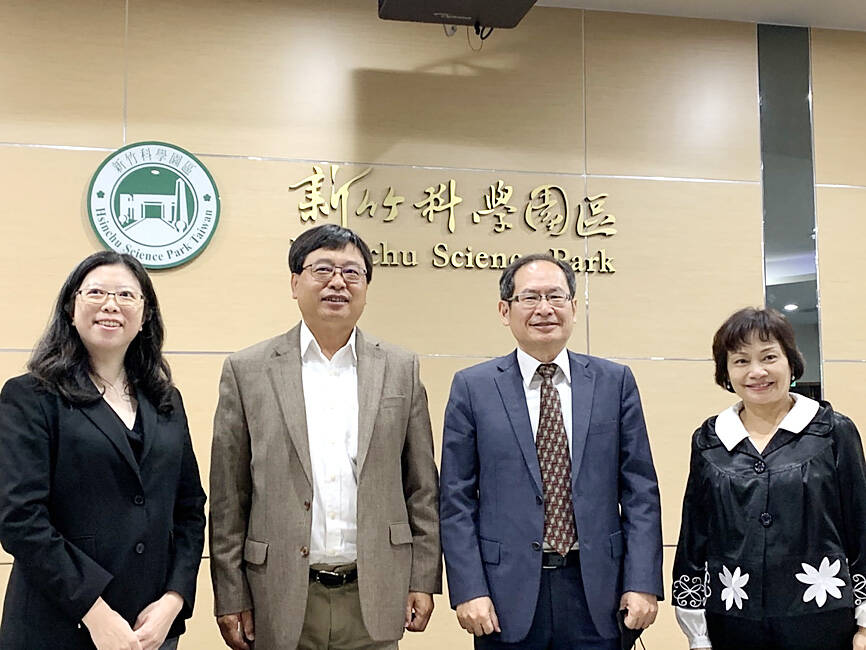Taiwan Semiconductor Manufacturing Co (TSMC, 台積電) is to build a wafer fab deploying 1 nanometer (nm) process technology at the Longtan (龍潭) campus of Hsinchu Science Park (新竹科學園區), Hsinchu Science Park Bureau Director-General Wayne Wang (王永壯) said yesterday.
The bureau completed a pilot project in the middle of last month for the third expansion phase of the Longtan Science Park (龍潭科學園區) in Taoyuan to accommodate the new TSMC plant, Wang told a news conference.
The pilot expansion project has been submitted to the National Science and Technology Council, which would next forward the project to the Cabinet for approval, Wang said.

Photo: Grace Hung, Taipei Times
“The efforts by the government to push for the construction of TSMC’s 1-nanometer process fab are proceeding smoothly,” he added.
Local media reports have said that the Longtan park’s third expansion phase would cover 150 hectares.
As 90 percent of the land is privately owned, it would require a huge effort to expropriate the land needed, the reports said.
2-NANOMETER FAB
Meanwhile, a new expansion plan in the Central Taiwan Science Park (中部科學園區) passed its third review yesterday, clearing the way for its final passage during a general review early next year, which would allow TSMC to build a 2-nanometer fab by the middle of next year, the Central Taiwan Science Park Administration said yesterday.
The administration said in a statement that it would submit supplementary information about the second-phase expansion plan to the Environmental Protection Administration as soon as possible after receiving a written record of the review.
The administration aims to complete all administrative procedures and hand over the land to local foundry companies to build new factories by the middle of next year, it said.
It added that it plans to attract other technology firms to set up facilities in the park to support the expansion and development of the semiconductor industry in Taiwan.
The development project would create NT$485.7 billion (US$15.95 billion) in production value a year and 4,500 direct jobs, the statement said.
TSMC plans to start pilot production of 2-nanometer chips in the second half of 2024 and commence mass production in 2025.
Its development of 2-nanometer process technology is progressing well and is even a little ahead of its schedule, TSMC chief executive C.C. Wei (魏哲家) said in October.
Customer engagement with the 2-nanometer chips is comparable with their engagement with the company’s 3-nanometer and 5-nanometer chips, he said.
TSMC said its 2-nanometer technology would be the most advanced in terms of density and energy efficiency when it is introduced.
ARIZONA FAB
The company is scheduled to hold a “first tool-in” ceremony for its new Arizona fab today to mark the installation of the first batch of production equipment, with US President Joe Biden expected to attend the event.
The company is spending US$12 billion to build a 5-nanometer fab in Arizona, with mass production to start in 2024. It plans to introduce 3-nanometer process technology during the second phase of the Arizona investment.

TECH CLUSTER: The US company’s new office is in the Shalun Smart Green Energy Science City, a new AI industry base and cybersecurity hub in southern Taiwan US chip designer Advanced Micro Devices Inc (AMD) yesterday launched an office in Tainan’s Gueiren District (歸仁), marking a significant milestone in the development of southern Taiwan’s artificial intelligence (AI) industry, the Tainan City Government said in a statement. AMD Taiwan general manager Vincent Chern (陳民皓) presided over the opening ceremony for the company’s new office at the Shalun Smart Green Energy Science City (沙崙智慧綠能科學城), a new AI industry base and cybersecurity hub in southern Taiwan. Facilities in the new office include an information processing center, and a research and development (R&D) center, the Tainan Economic Development Bureau said. The Ministry

ADVERSARIES: The new list includes 11 entities in China and one in Taiwan, which is a local branch of Chinese cloud computing firm Inspur Group The US added dozens of entities to a trade blacklist on Tuesday, the US Department of Commerce said, in part to disrupt Beijing’s artificial intelligence (AI) and advanced computing capabilities. The action affects 80 entities from countries including China, the United Arab Emirates and Iran, with the commerce department citing their “activities contrary to US national security and foreign policy.” Those added to the “entity list” are restricted from obtaining US items and technologies without government authorization. “We will not allow adversaries to exploit American technology to bolster their own militaries and threaten American lives,” US Secretary of Commerce Howard Lutnick said. The entities

Minister of Finance Chuang Tsui-yun (莊翠雲) yesterday told lawmakers that she “would not speculate,” but a “response plan” has been prepared in case Taiwan is targeted by US President Donald Trump’s reciprocal tariffs, which are to be announced on Wednesday next week. The Trump administration, including US Secretary of the Treasury Scott Bessent, has said that much of the proposed reciprocal tariffs would focus on the 15 countries that have the highest trade surpluses with the US. Bessent has referred to those countries as the “dirty 15,” but has not named them. Last year, Taiwan’s US$73.9 billion trade surplus with the US

‘SWASTICAR’: Tesla CEO Elon Musk’s close association with Donald Trump has prompted opponents to brand him a ‘Nazi’ and resulted in a dramatic drop in sales Demonstrators descended on Tesla Inc dealerships across the US, and in Europe and Canada on Saturday to protest company chief Elon Musk, who has amassed extraordinary power as a top adviser to US President Donald Trump. Waving signs with messages such as “Musk is stealing our money” and “Reclaim our country,” the protests largely took place peacefully following fiery episodes of vandalism on Tesla vehicles, dealerships and other facilities in recent weeks that US officials have denounced as terrorism. Hundreds rallied on Saturday outside the Tesla dealership in Manhattan. Some blasted Musk, the world’s richest man, while others demanded the shuttering of his